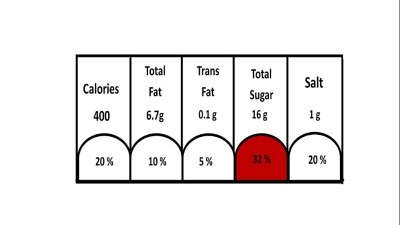Reformulation in India: Good taste and clear nutrition labelling found to be key factors for success

According to the Healthier Product Reformulation in India report released by IGD and Food Industry Asia today, 83% of consumers reported that they would be ‘happy if the product recipes are changed to make them healthier, provided they are still as tasty’.
“Taste is one of the factors that can hinder consumer acceptance, as it remains one of the top considerations when buying products,” FIA Policy Director Steven Bartholomeusz told FoodNavigator-Asia.
“Hence, it is crucial that companies maintain existing flavour profiles while improving the nutritional quality of their food and beverage portfolios.”
Such reformulation is more easily said than done. As an example, earlier this year the CEO of Malaysian beverage firm F&N described reformulation as a ‘difficult’ endeavour in terms of meeting consumer taste and price needs, after it was announced that some 90% of the company’s product portfolio would be affected by the recently-implemented sugar tax.
However, it will still be necessary for food firms to take this very seriously due to overwhelming consumer demand – according to the report, 81% of food companies ‘should tweak their recipes to make products healthier’.
"According to this research, 69% of companies (participating in the study) have been working to reformulate their products. This includes reformulating existing products to reduce artificial colours, flavours and preservatives, removing saturated fat and fortifying products with fibre, protein and vitamins, which are all aligned with the country’s nutrition strategy," said Bartholomeusz.
In addition, nutritional labelling was also identified as a key factor driving consumer appeal - 81% of consumers said that the ‘clear display of nutritional information on pack’ was an important element to them when choosing to purchase food and grocery items.
“Nutrition plays a particularly important role in how Indian consumers choose products,” said the report authors.
“97% claim to look at nutrition information on pack at least some of the time and 63% claim to look regularly.”
The importance of nutritional labelling was also found to be more important to Indian consumers (63%) as compared to those in Singapore (42%) as a whole, possibly due to the higher risk of food adulteration and fraud in the country especially for items such as dairy, alcohol, oil and more.
Reasons for reformulation
Health reasons are a major factor driving reformulation in India, which ‘faces a double burden of malnutrition with high rates of undernutrition coexisting alongside increasing rates of obesity and NCDs’.
“India represents 40% of the world’s diabetes burden, affecting 72 million in 2017 [and an] estimated 98 million may be diagnosed with Type 2 diabetes by 2030, whereas [an] estimated 135 million are affected by obesity in India, [with some] 20% of the adult population were classified as overweight or obese in 2016,” said the report.
As such, F&B companies have noticeably altered the direction of their reformulation efforts over the last five years, from fortification towards the removal/reduction of artificial additives, saturated fats, allergens and sugar content.
“Companies are [also] committed to adding fibre and wholegrain in their product offerings, which may not be a top nutrition priority to consumers but is strongly recommended by nutrition experts,” said the authors.
Public health concerns aside, government regulations were also seen to play an important role, with 62% of all surveyed companies saying that their ‘main motivation’ for reformulation was to ‘respond to government regulations’.
That said, 68% of companies were ‘concerned’ about the ‘lack of clear national nutrition targets/guidelines’ in the country, and 46% felt that existing national nutrition targets were ‘unrealistic’.
“Currently there is more of a voluntary approach to reformulation. The government is considering a more formal approach which is required to get the whole industry moving. Uniform policy is what we need,” stated the report.
India’s primary food safety and regulatory agency is the Food Safety and Standards Authority of India (FSSAI), which has been known to propose and initiate many food-related policies but delayed the enforcement of many of these after industry stakeholders voiced complaints.
Challenges to reformulation
In addition, consumer acceptability and budget limitations were found to be major hurdles for reformulation in the country as well.
"Consumer acceptance to reformulate products is a challenge across all the markets where this research [was conducted]," said Bartholomeusz.
According to company feedback in the report: “The issue with asking consumers what they want when it comes to health is the discrepancy between claimed and actual behaviour. They say they want low sugar and low salt but in reality they don’t want to compromise."
“[There is] a serious issue of high blood pressure in India. Salt intakes are as high as 14-15g/day so the Indian palate is accustomed to food products that are high in salt. This makes salt reduction challenging.”
India is also considered a ‘price-sensitive’ market, so if reformulation results in any sort of increased costs, companies found consumer acceptance to this to be ‘low’.
As for whether high rates of adulteration in the country could pose a challenge to reformulation, Bartholomeusz said: "Distrust of reformulated foods and the stigma of adulteration are sometimes cited as reasons for rejection from consumers, but our research has shown that they did not constitute major barriers in the Indian market."
"In fact, meeting consumer demand was cited as one of the top five motivators for reformulation as there is strong commercial incentive for companies to provide healthier products."
He added that increased government support would also 'go a long way' in terms of accelerating the industry's progress.
"73% of companies said that with more fiscal incentives from the government, they would be encouraged to conduct more R&D associated with reformulation. This is particularly relevant to the local market, as 90% of the companies conduct their R&D efforts in India and for a lot of smaller players, costs of reformulation and technical knowledge can be a barrier."



















